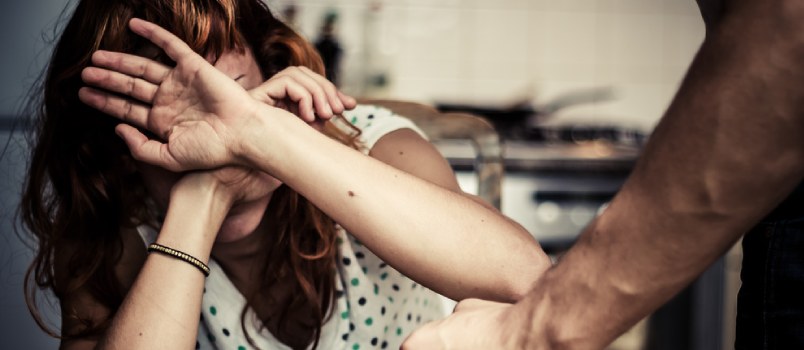What Does It Take to Get Out of an Abusive Relationship?
Leaving an abusive relationship—regardless of whether the abuse is verbal, emotional, or physical—can be a tall order.

Whether the abuse is verbal, emotional, or physical, breaking apart from such a relationship can be challenging.
Many abused people blame themselves because they accept at face value the abuser's assertion that they brought it on.
In order to break free from an abusive partner, victims must first change their beliefs about who they are and how their abuser used them.

Whether the abuse is verbal, emotional, or physical, breaking apart from such a relationship can be challenging. Leaving an abusive partner is challenging for many reasons.3,8 The following are just a few potential roadblocks that could be encountered.
Cyclical Abuse
It's common for abusive relationships to repeat themselves. Sometimes there is little to no abuse, and then all of a sudden it becomes severe. When the victim's tolerance for the abuse has reached its limit, they may resolve to end the relationship the very following day.
But there's a solid reason they don't usually follow through on their word. After acting out in particularly violent ways, the abuser usually goes into hiding for a period and shows signs of compassion for the abused partner.2,6
It doesn't matter how many times a survivor of abuse has gone through this cycle, they will always hold out hope that this time things will be different. This is especially true if the abuser is hiding and acting nice towards them. They may remember the happy days in the relationship more vividly than the bad ones.
Feelings of Responsibility
Victims of abuse often internalise blame because they believe their abuser's frequent assertions that they were to blame for the violence.2,4 The victim may interpret the repetition of abusive relationships as confirmation that they are to blame for the relationship's difficulties and that they trigger and deserve the violence. Why else do so many of their relationships degenerate into abuse?
A Pattern of Abusive Relationships
violence victims often face relational violence in every relationship they've ever been in, but it's not because they deserve it or provoke it. The true explanation is that they have a number of personality traits that abusers know they may use to their advantage. As an example, a person who has been abused may have innately high levels of trust, loyalty, giving, kindness, subservience, selfishness, forgiveness, passivity, conflict avoidance, and optimism.

Addicts are naturally drawn to partners with character flaws that are easy to exploit since they "get off" on abusing others.1,2 Not only are they pros at finding and tracking down their "prey," but they also have the added bonuses of being superficially charming and overconfident, both of which help them capture their "prey" and turn them into dependents.
Because of these qualities, those who are more vulnerable to abuse are much more likely to form connections with abusive people who are out for their own benefit.
Financial Dependence and Fear
Victims of domestic violence frequently rely on their abuser for financial support. They run the risk of being unable to support themselves financially, of losing custody of their children (if they have any), and of putting their own and their loved ones' safety in jeopardy if they leave, as abusers who are forsaken by their spouses may seek vengeance. Leaving an abusive partner might already be difficult, but these factors can make it considerably more so.9,10
Abuse Victims Who Manage to Leave
Despite the difficulty, many victims are able to leave their violent spouses, and some are even able to stop the cycle of abusive relationships.
It's not hard to picture the weight lifted off their shoulders once they are finally able to escape their abuser. Sadly, people may experience a range of bad and damaging emotions alongside any sense of relief. Many years after fleeing an abusive relationship, PTSD affects the majority of abuse survivors.
New Research on Pre- and Post-Abuse Perceptions
Psychologists Amandine Dziewa and Fabienne Glowacz (2022) interviewed 21 abuse victims of both sexes to determine if there were any consistent themes in their experiences as they planned and ultimately fled violent relationships.4
The study's subjects were more inclined to leave an abusive partner after experiencing a profound shift in their understanding of themselves, their partner, and the nature of their relationship. In order to break free from an abusive partner, victims must first alter their conceptions of who they are, who their partner is, and what kind of relationship they are in.5,7
Extrinsic factors can hasten the process of leaving. For instance, if the abuser suddenly escalates the violence, it can cause the victim to flee the relationship out of sheer shock and anguish.
Self-Restructuring
Self-restructuring, or an identity shift, is essential for those who have been the victims of abusive relationships to break free from them for good.5,6,7 The first step in healing from the effects of relationship violence is acknowledging and accepting one's identity as a victim.
Victims of abuse often need the assistance of professionals and the understanding of their loved ones before they can accept that they are victims of abuse. Victims of abuse can only accept themselves as such if they come to terms with the fact that they did nothing to bring about the abuse and bear no responsibility for it.2,4,5
Victims of abuse can break the cycle of abuse only if they reframe their understanding of who they are and how they relate to their abusers.5,7
Changing the victim's subjective understanding of their "self," their partner's true nature, and the abusive nature of their relationship may be necessary for them to realise the root of their relationship woes and finally decide to end their toxic relationship for good.













